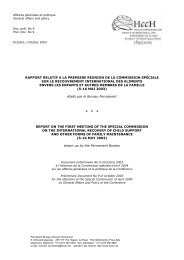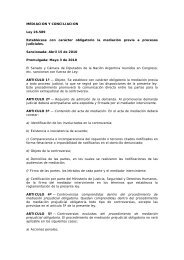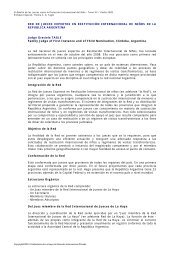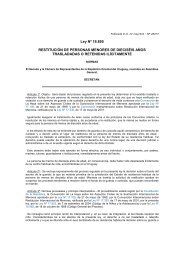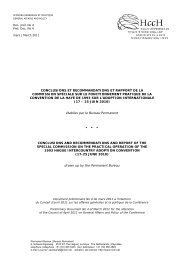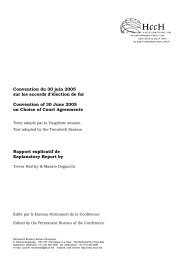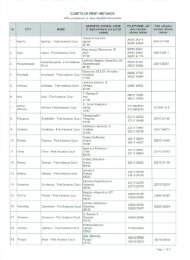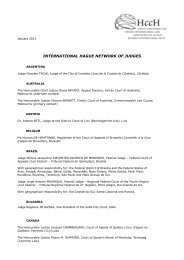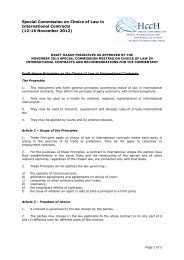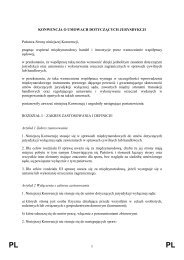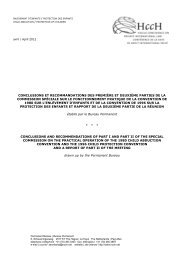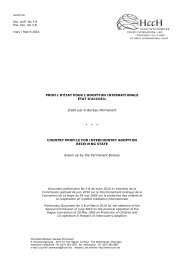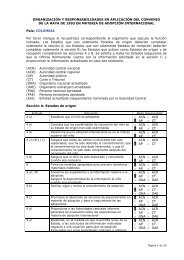aperçu des réponses au questionnaire accompagnant la ... - HCCH
aperçu des réponses au questionnaire accompagnant la ... - HCCH
aperçu des réponses au questionnaire accompagnant la ... - HCCH
Create successful ePaper yourself
Turn your PDF publications into a flip-book with our unique Google optimized e-Paper software.
Question Réponse / Reply État / State<br />
6.2. Develop. re “in<br />
civil or commercial<br />
matters”?<br />
[F] Oui, <strong>la</strong> Convention a récemment fait l'objet de jurisprudence pour <strong>la</strong> première fois <strong>au</strong> Québec.<br />
[E] Yes, the Convention has recently been the subject of judicial decisions for the first time in Quebec.<br />
Since 1992 there has been a significant increase in requests for service of non-judicial documents, the<br />
litigation character of which appears to be questionable. However, the Irish Central Authority has not yet declined to<br />
serve on the basis of the doubts aforesaid.<br />
No / Non<br />
Portugal : No. Our Courts tend to follow the interpretation of the European Court of Justice on the concept of civil<br />
and commercial matters under the Convention of 27 September 1968 on Jurisdiction and the Enforcement of<br />
Judgements in Civil and Commercial Matters (“Brussels Convention”).<br />
[…] In the legal system of the MSAR, the difficulties that arise in other countries do not exist, as the only matters<br />
that are excluded from the phrase “civil and commercial matters” are administrative matters.<br />
Some States do not execute requests in cases, which they define as administrative and not included in “civil and<br />
commercial matters”.<br />
The phrase "in civil or commercial matters" may give rise to some difficulties in interpretation of its scope bec<strong>au</strong>se<br />
the interpretation of the phrase may differ between a requesting State and a requested State. A typical<br />
example of this divergence can be seen in the question whether or not the documents of administrative cases<br />
should be within its scope of the phrase. We understand that each State shall have <strong>au</strong>thority to interpret it<br />
<strong>au</strong>tonomously. However it is necessary and beneficial to know the interpretation of the phrase and the practical<br />
operation in each State. Where the interpretation of such phrase becomes a point of issue in the civil case in Japan,<br />
a court seized interprets it <strong>au</strong>tonomously.<br />
L’expression “en matière civile et commerciale” utilisée par ce bure<strong>au</strong> indique <strong>la</strong> notification de tous les actes, à<br />
l’exclusion <strong>des</strong> actes en matière pénale et administrative.<br />
The Spanish Central Authority adopts a fairly broad approach to this concept, and is ready to accept requests for<br />
service of documents under the Service Convention that re<strong>la</strong>te to almost anything except criminal offences. In<br />
this respect, service has been granted for judicial documents pertaining to the <strong>la</strong>bour and administrative branch<br />
of our jurisdiction.<br />
We have encountered one particu<strong>la</strong>r problem with the scope in re<strong>la</strong>tion to one country´s <strong>au</strong>thorities (France) who<br />
tried to serve documents in administrative matters (orders for fines) on the basis of the Convention. Even in this<br />
case, we do not think this was a problem with the interpretation of the scope, but rather finding a way to serve<br />
documents in situations where there is no other international instrument. Slovak courts do not seem to have<br />
difficulties with the scope “civil and commercial” matters and it has always been interpreted widely (including<br />
family <strong>la</strong>w, succession, <strong>la</strong>bour <strong>la</strong>w matters as well). The only area of “uneasiness” are cases of presumably<br />
administrative <strong>la</strong>w decided by foreign (administrative) courts (we had cases with Germany), where sometimes for<br />
us as a requested country is difficult to assess whether the case does or does not fall under the scope. But even in<br />
such margin cases we provide the requested assistance, though we advise the Slovak courts that they cannot<br />
Suisse, Ukraine<br />
Canada (Québec)<br />
Ir<strong>la</strong>nde<br />
Bé<strong>la</strong>rus, Bulgarie<br />
(depuis 2000), Canada,<br />
Chine, Chine<br />
(Hongkong),<br />
Danemark, Etats-Unis,<br />
France, Fin<strong>la</strong>nde,<br />
Ir<strong>la</strong>nde, Luxembourg<br />
(absence de jurispr.),<br />
Norvège, Pays-Bas,<br />
Portugal, Suisse,<br />
Ukraine<br />
Chine (Macao)<br />
Suède<br />
Japon<br />
Italie<br />
Espagne<br />
Rép. Slovaque<br />
Page 10 of 69



